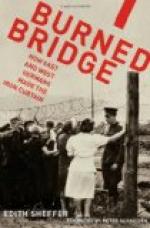“No, no,” she protested. “Keep your chairs, please.”
“Mr. Thompson,” Carr’s keen old eyes flickered between the two men and the girl. “My daughter. Mr. Thompson is the latest leader of the forlorn hope at Lone Moose, Sophie.”
Mr. Thompson murmured some conventional phrase. He was mightily disturbed without knowing why he was so disturbed, and rather fearful of showing this incomprehensible state. The girl’s manner put him a little at his ease. She gave him her hand, soft warm fingers that he had a mad impulse to press. He wondered why he felt like that. He wondered why even the tones of her voice gave him a thrill of pleasure.
“So you are the newest missionary to Lone Moose?” she said. “I wish you luck.”
Although her voice was full, throaty like a meadow lark’s, her tone carried the same sardonic inflection he had noticed in her father’s comment on his mission. It pained Thompson. He had no available weapon against that sort of attack. But the girl did not pursue the matter. She said to her father:
“Crooked Tree’s oldest son is in the kitchen and wants to speak to you, Dad.”
Carr rose. So did Thompson. He wanted to get away, to think, to fortify himself somehow against this siren call in his blood. He was sadly perplexed. Measured by his own standards, even to harbor such thoughts as welled up in his mind was a sinful weakness of the flesh. He was in as much anxiety to get away from Carr’s as he had been to find a welcome there.
“I think I shall be moving along,” he said to Carr. “I’ll say good-day, sir.”
Carr thrust out a brown sinewy hand with the first trace of heartiness he had shown.
“Come again when you feel like it,” he invited. “When you have time and inclination we’ll match our theories of the human problem, maybe. Of course we’ll disagree. But my bark is worse than my bite, no matter what you’ve heard.”
He strode off. Sophie bowed to Thompson, nodded to Tommy Ashe, and followed her father. Ashe got up, stretched his sturdy young arms above his fair, curly head. He was perhaps a year or two older than Thompson, a little thicker through the chest, and not quite so tall. One imagined rightly that he was very strong, that he could be swift and purposeful in his movements, despite an apparent deliberation. His face was boyishly expressive. He had a way of smiling at trifles. And one did not have to puzzle over his nationality. He was English. His accent and certain intonations established that.
He picked up a gun now from where it stood against the wall, whistled shrilly, and a brown dog appeared hastily from somewhere in the grass, wagging his tail in anticipation.
“Mind if I poke along with you,” he said to Thompson. “There’s a slough over beyond your diggin’s where I go now and then to pick up a duck or two.”
They fell into step across the meadow.




